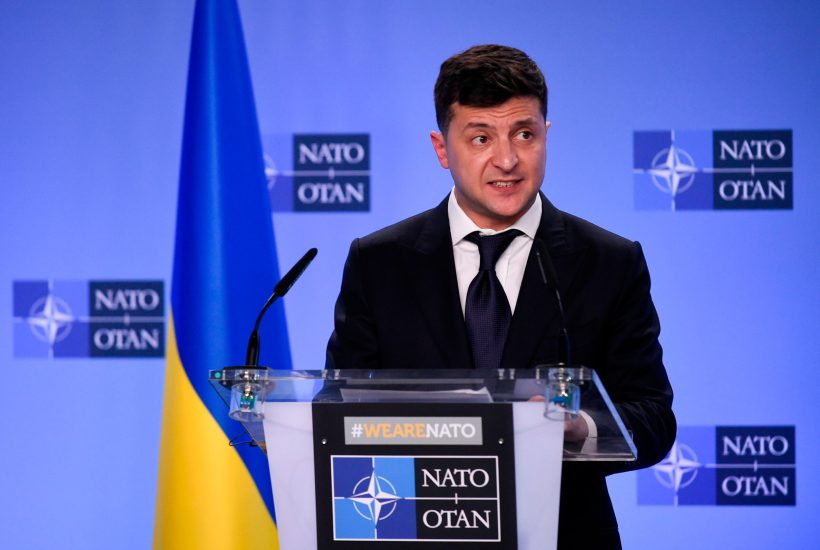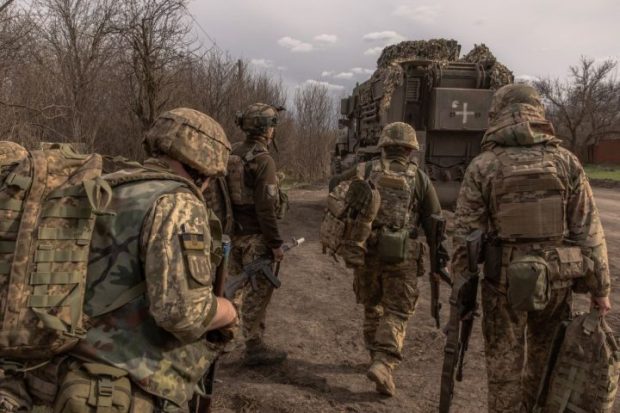Shortly after the invasion of Ukraine, Volodymyr Zelensky made an offer to Vladimir Putin. Ukraine would drop its ambition to join Nato and would instead stay neutral, he said. It would not align with the West, in exchange for an end to hostilities. It was a sincere offer, and unpopular with Ukrainians. Yet it was significant: Putin had cited Ukraine’s Nato ambitions as the main reason for the invasion, saying it showed the West was somehow threatening Russia. But today, that offer ended and Zelensky is seeking the ‘accelerated’ Nato accession granted to Finland and Sweden this year.
Will Nato accept? Jens Stoltenberg, Nato Secretary-General, dodged the question when asked today. ‘Our focus now is to help Ukraine against a Russian brutal invasion,’ he said. On Putin’s threats to use nuclear weapons, he said that ‘Ukraine has the right to retake its occupied territories. If we accept the annexation, it means we accept the nuclear blackmail’. Any membership decision, he said, must be approved by all 30 members of the alliance.
‘We know it’s possible,’ said Zelensky today. ‘We have seen Finland and Sweden start [fast-track] accession to the alliance this year’. But his request is, in reality, a political gesture. Countries like Hungary would surely veto. To be a Nato member is to ask for Article V protection: that an attack on one member is regarded as an attack on them all. As Zelensky knows, it’s the largest of asks, and one that Kyiv does not expect to be granted any time soon. Annalena Baerbock, Germany’s foreign minister, has responded by saying “we are doing everything we can to ensure that other countries and NATO are not drawn into this war.”
Germany opposed the last time Ukraine applied to join Nato, in 2008. Estonia, Latvia, Lithuania and Canada have already stated that they would support a Ukrainian application but the more realistic option is a set of international mutual-defence guarantees that would come into play should a peace deal every be reached with Russia. Ukraine calls it the Kyiv Security Compact, and Zelensky has already asked the West to consider it.
This is all in the wake of Putin’s ceremony today which claimed four regions of Ukraine as Russian. The annexation is intended to imply that any attempt to liberate them would be seen as an attack on Russian soil – thereby raising the prospect of a nuclear response. Moscow is trying to present a brave face. A video released by Russian state media shows tens of thousands of people now on Red Square in Moscow and Putin shouting to them ‘victory will be ours!’.
But victory for Putin looks more elusive than ever. News from Ukraine today is that Ukrainian troops have almost encircled Russian soldiers in Lyman, in Donetsk, and cut critical ground lines of communication. While Putin gives his speeches, his promised reinforcement seems not to come: there are videos of Russian troops running away. It is reported that some 200,000 Russian men have left the country, fleeing the conscription.
Now, there is a negotiation stalemate. Zelensky has been saying that any sham referendum on Ukrainian regions joining Russia would make it ‘impossible … to continue any diplomatic negotiations with the President of Russian Federation, and he knows it very well’. He has now refused any talks for as long as Putin is in power. For his part, Putin wants talks now. ‘We call on the Kyiv regime to immediately cease fire and war, which it started back in 2014, and return to the negotiating table. We are ready for it. But we will not discuss the results of the referendums’, said Putin.
For Ukrainians, this is not history repeating itself. The West’s response to the annexation of Ukrainian territories was much more robust today than after the 2014 occupation of Crimea. After the political theatre in Moscow, new sanctions against Russian companies, goods and individuals were announced by London, New York and Toronto. In Kyiv, talk is turning to the risk of nuclear strikes – either in the capital or Lviv. As Putin keeps losing the ground war and struggles to mobilise reinforcements, the conflict could be entering its most dangerous stage yet.
Svitlana Morenets writes a weekly email, Ukraine in Focus, for The Spectator. Sign up for free here.
Got something to add? Join the discussion and comment below.
Get 10 issues for just $10
Subscribe to The Spectator Australia today for the next 10 magazine issues, plus full online access, for just $10.



















Comments
Don't miss out
Join the conversation with other Spectator Australia readers. Subscribe to leave a comment.
SUBSCRIBEAlready a subscriber? Log in